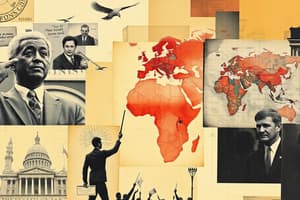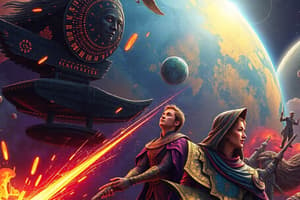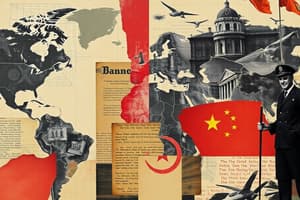Podcast
Questions and Answers
What are the three core principles that shape solutions to collective goods problems in international relations?
What are the three core principles that shape solutions to collective goods problems in international relations?
- Power, stability, governance
- Conflict, trade, value
- Cooperation, diplomacy, power
- Dominance, reciprocity, identity (correct)
Which type of actors are considered most important in international relations?
Which type of actors are considered most important in international relations?
- International organizations
- Non-governmental organizations
- Multinational corporations
- States (correct)
How has globalization generally been conceptualized by various scholars?
How has globalization generally been conceptualized by various scholars?
- As the slow decline of international connectedness
- As a historical event with no future implications
- As the growing scope, speed, and intensity of connectedness (correct)
- As a process strengthening state power only
What significant effect did the Cold War have on world politics?
What significant effect did the Cold War have on world politics?
What was the result of the U.S. military campaign in Iraq?
What was the result of the U.S. military campaign in Iraq?
Which type of actors are gaining influence in international relations apart from states?
Which type of actors are gaining influence in international relations apart from states?
What did the NATO campaign in Afghanistan primarily aim to achieve?
What did the NATO campaign in Afghanistan primarily aim to achieve?
What are the three levels of analysis in international relations?
What are the three levels of analysis in international relations?
What role do antiglobalization activists play in international discussions?
What role do antiglobalization activists play in international discussions?
What was a key lesson learned from World Wars I and II regarding foreign policies?
What was a key lesson learned from World Wars I and II regarding foreign policies?
Flashcards
International Relations (IR)
International Relations (IR)
The study of political outcomes in international security and global economics.
State
State
A significant actor in IR, a sovereign entity with a defined territory and population.
Dominance
Dominance
An important principle in IR that emphasizes the use of power and coercion to achieve desired outcomes.
Reciprocity
Reciprocity
Signup and view all the flashcards
Identity
Identity
Signup and view all the flashcards
Collective Goods Problem
Collective Goods Problem
Signup and view all the flashcards
Intergovernmental Organizations (IGOs)
Intergovernmental Organizations (IGOs)
Signup and view all the flashcards
Non-governmental Organizations (NGOs)
Non-governmental Organizations (NGOs)
Signup and view all the flashcards
Multinational Corporations (MNCs)
Multinational Corporations (MNCs)
Signup and view all the flashcards
Globalization
Globalization
Signup and view all the flashcards
Study Notes
International Relations (IR)
- IR profoundly affects daily life, with everyone participating.
- It's a political science field focused on explaining outcomes in international security and economics.
- Theories complement narratives in explaining international events.
- Core principles (dominance, reciprocity, identity) influence solutions to collective problems.
Actors in International Relations
- States are major actors, based on the sovereignty of ~200 independent states.
- Non-state actors (IGOs, NGOs, MNCs) exert growing influence.
- Multiple levels of analysis (individual, domestic, systemic) explain outcomes.
Globalization and Its Effects
- Globalization is increasing interconnectedness worldwide, potentially weakening, strengthening, or transforming state power.
- Antiglobalization activists oppose corporate power, but have differing goals and tactics.
Historical Events and Their Impact
- World Wars I and II left mixed lessons about foreign policies.
- The Cold War (East-West rivalry) created stability but made global South states proxy battlegrounds.
- Post-Cold War era offers hopes for peace and cooperation but new conflicts emerged.
- The Iraq War divided powers, increased anti-Americanism, and led to prolonged violence.
- The Afghanistan War ended in 2014, though some troops remain. Bin Laden was killed in Pakistan in 2011.
- The Arab Spring led to regime change in several countries and a Syrian civil war among other events.
- Post globalization backlash events include Brexit and the election of Donald Trump, which highlighted national over global concerns.
Studying That Suits You
Use AI to generate personalized quizzes and flashcards to suit your learning preferences.




